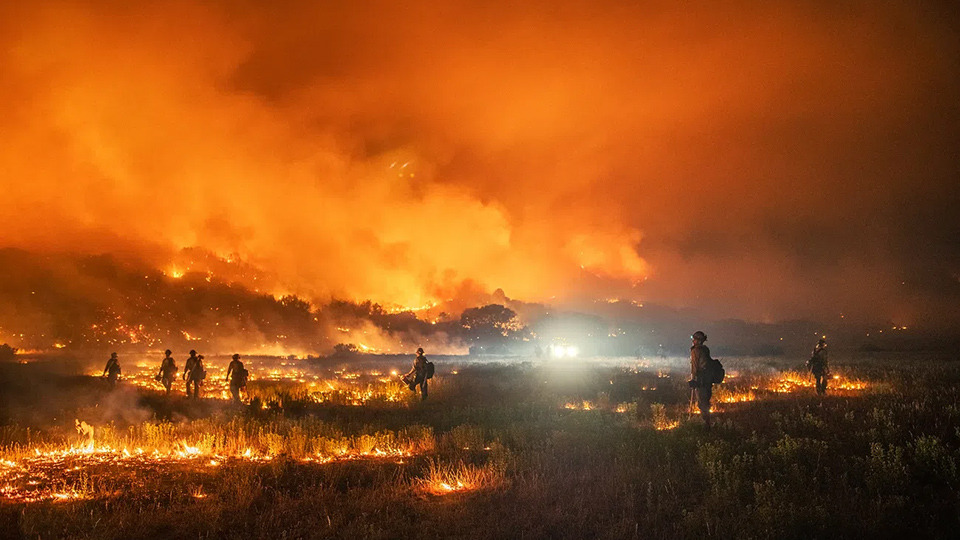News that Americans again have died after failing to receive emergency alerts, this time in Hawaii, the Advanced Warning and Response Network (AWARN) Alliance has called upon the U.S. government to convene a multi-stakeholder effort for creating a more robust nationwide U.S. emergency warning system, building resilience to natural disasters exacerbated by climate change. A better system would fill a missing piece of the Administration’s climate agenda and can save lives, reduce property damage, and assist communities in recovery.

Caption: Wildfires, hurricanes, and other disasters frequently destroy power lines and cell towers, infrastructure needed for emergency alerts and recovery information. TV and radio stations tend to stay on the air with back-up power, which, combined with small home battery-powered receivers, can provide a lifeline for emergency messaging. Credit: AWARN
Widespread adoption of what AWARN calls “Advanced Emergency Information” will enable emergency authorities to broadcast multilingual emergency messages that include rich media, such as fire and storm tracks, evacuation routes, shelter locations, and flood levels. This provides people with more information and reduces the chance of what social scientists call “milling”, or the delay taking protective actions as they seek confirmation of more information. The accurate geo-targeting capabilities also help ensure that only affected residents will receive the messages, avoiding the public’s desensitization.
Also crucially, a system based on Next Gen Broadcasting of alerts to battery-powered mobile devices would create a lifeline for people even when wireless networks and the electric grid fail, as they have in countless disasters, including the Maui wildfires.
Founded in 2016, AWARN is composed of broadcasters, consumer electronics manufacturers, B2B tech companies, and trade associations that are working together to promote the adoption of the ATSC 3.0 transmission standard, also known as NextGen TV or NextGen Broadcasting, to deliver geo-targeted and multimedia-enabled emergency messages to residents.
AWARN is headed by executive director John Lawson, a broadcasting industry veteran and emergency alerting advocate. He was the CEO of the Association of Public Television Stations during the 9/11 attacks, which strengthened his resolve to develop a better emergency messaging system. Lawson was invited as an expert panelist at the White House Earthquake Resilience Summit in 2016 and has served on three Federal Communications Commission emergency communications advisory committees.
To build support at the grassroots level, AWARN has conducted a series of roundtable discussions that bring emergency managers and local TV broadcasters together to discuss voluntary deployment of a new system using NextGen Broadcasting. So far, meetings have been held in Santa Barbara, New Orleans, Washington, DC, and Raleigh.
According to Lawson, the roundtables have revealed strong interest among local governments, emergency management authorities, and broadcasters in deploying a new voluntary system. As a result of the Washington, DC roundtable, a pilot test of the system has been launched with the Metropolitan Washington Council of Governments and Sinclair Broadcast Group. Initially disseminating alerts from Arlington and Fairfax Counties in Virginia, the project is set to expand to more jurisdictions in the National Capital Region over the next few months.
Lawson expects that a wide range of companies also would support a new warning system. An investment in an advanced emergency warning system can fulfill the environmental, social, and governance (ESG) goals of investors, as the project will be able to save more lives during disasters.
“In the face of worsening disasters due to climate change, the US needs a stronger national emergency information system. The technology to implement it already exists and is being tested in real-world situations in the nation’s capital. It soon becomes an issue of taking it to scale, and that’s why presidential leadership is crucial,” says Lawson.
“The creation of a next-gen alerting system for climate change resilience is low-hanging fruit for the Biden Administration. The technology is available. Key stakeholders are on record with the FCC supporting a voluntary, multistakeholder initiative. We just need federal leadership to bring better alerting to the American public,” Lawson says.
Media contact:
Name: John M. Lawson
Email: [email protected]






